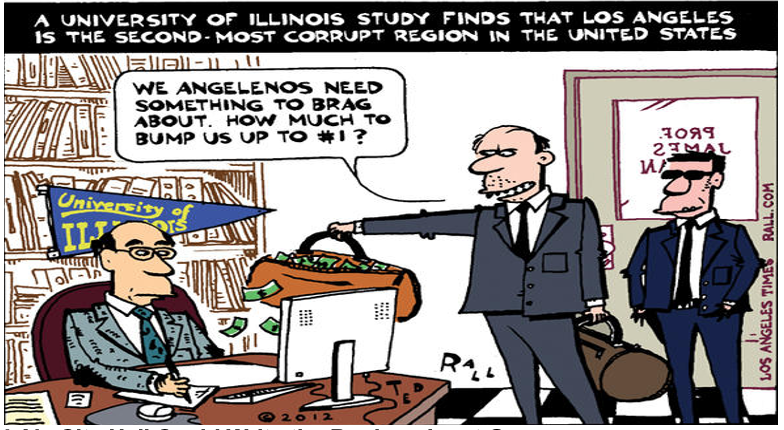CommentsPLANNING WATCH-Robert Reich is a distinguished UC Berkeley professor of public policy, a former Secretary of Labor, and a frequent ed-op writer.
I often admire his articles, but his recent essay, “The Real Difference Between Democrats and Republicans,” was only half-right.
“The Democratic Party is basically a governing party, organized around developing and implementing public policies. The Republican Party has become an attack party, organized around developing and implementing political vitriol.”
I don’t dispute Professor Reich’s claims that the Republicans have become an attack party, as evidenced by Donald Trump’s nonstop bullying and interruptions during Tuesday’s Presidential debate. But had the distinguished professor looked south to LA’s deep blue City Hall, his argument that the Democrats are the party of good governance would collapse. He would see a city that is falling apart at the seams. Its streets and sidewalks are crumbling.
LA’s air pollution and traffic congestion is the worst in the nation. Its homeless population grows larger, year-by-year. Its water mains and sewer lines regularly burst. Its urban forest is shrinking, a consequence of real estate development. Out-of-character, out-of-scale cracker box apartments and McMansions have blighted its neighborhoods. Its municipalized electrical grid suffers from frequent blackouts. Its City Council regularly pays out millions in LAPD lawsuits for repeated violations of Angelenos’ civil liberties. At the same time, the LAPD consumes over half of the City’s discretionary budget, despite massive Black Lives Matter demonstrations and the alternative Peoples Budget.
While the Federal government’s stinginess has made some of these problems worse, especially homelessness, it is not the primary cause. A change in Federal policy, such as bailing out local governments during the Pandemic, would help, but it would not reverse a long list of inept City Hall practices. As a result, Los Angeles has become a corrupt, unplanned, unmonitored city, where felons-in-waiting and slippery bamboozlers make key decisions, in synch with the real estate speculators who are their key donors and beneficiaries.

$100 bills dished out to the Chair of the LA City Council’s Planning and Land Use Committee.
Nevertheless, LA’s officials have access to three powerful tools that could still salvage the city: General Plans, monitoring, and the California Environmental Quality Act (CEQA). If implemented, they could produce the sound public policies that Robert Reich prematurely attributes to his fellow Democrats. With one Republican and 18 Democrats holding elected office at LA’s deep blue City Hall, they could methodically transform a rapidly failing city into a well-governed one.
General Plan. California state law and the LA City's Charter require the city to prepare and adopt a General Plan. It must have seven mandatory elements (e.g. Housing), but can also include optional elements, such as Air Quality (1991), Climate Change, and Economic Development. By law, General Plans must be internally consistent, timely, and implemented through ordinances and budgets.
But as I have reported in previous Planning Watch columns, LA’s General Plan is out-of-date. Only a few mandatory elements are current, and other crucial elements are either ancient: Open Space (1973), Safety (1996), and Public Services and Infrastructure (1969), or simply missing (Urban Forest, Climate Change, Economic Development).
The all-important Land Use element consists of LA’s 35 Community Plans and two District Plans. According to the Los Angeles City Council, they should be updated every six years, but over 15 years of starts and stops, only a handful of Community Plans have been updated. While many Updates are underway, they have become a prop for up-zoning real estate schemes. When the City Council adopts them, real estate developers can then garner windfall profits by flipping properties -- unless the Superior Court again rescinds plans and up-zoning ordinances because they are based on spurious data.
Monitoring. All California General Law cities must annually monitor their General Plans to determine if their demographic assumptions are correct, if the plan’s goals are being met, and if the implementation programs are working. In the case of Charter Cities, such as Los Angeles, monitoring is optional. But Los Angeles legally committed itself to annual monitoring reports. While the Planning Department prepared several partial monitoring reports in the late 1990s, the monitoring unit still does not exist.
As a result, the City of Los Angeles is deliberately flying blind by refusing to monitor its plans.
Current General Plan elements and monitoring reports should be applied to the City’s operating and capital budgets. In fact, LA’s City Planning Commission is charged with reviewing the Capital Improvement Program for consistency with the General Plan. But this never happens. The General Plan’s policies and programs are totally disconnected from the City’s operating and capital budgets. These parallel lines never meet in the Mayor’s offices or the City Council’s chambers.
California Environmental Quality Act (CEQA). California has provided local municipalities a powerful tool, CEQA, to identify the environmental impacts, including climate change, for all public and private projects. Whether a project requires a smaller Mitigated Negative Declaration (MND) or a full Environmental Impact Report (EIR), decision makers are furnished irreplaceable information to approve, reject, or redesign a project to reduce its environmental impacts.
LA’s decision makers never take advantage of this good governance tool. Instead, they always certify the most environmentally damaging project alternative through a Statement of Overriding Considerations. These are unverified claims that a project will generate so many jobs or transit trips that the City Council can overlook a project’s adverse environmental impacts.
Unfortunately, City Hall’s actual record flies in the face of Professor Reich’s claims that Democrats govern through thoroughly vetted public policies.
Of course, Los Angeles, like Sacramento and the Federal government, could carefully review public policy options instead of surrendering to lobbyists and campaign donors. But for this to happen, we need to tell the apologists and the elected officials to stop gaslighting (deceiving) the public. Officials from both parties have become adept at lofty rhetoric, while in private or the small print turn government into an ATM for real estate developers, ig pharma, fossil fuel companies, health insurance corporations, military and police contractors, and Wall Street in your backyard.
(Dick Platkin is a former Los Angeles city planner who reports on local planning issues for CityWatch. He serves on the board of United Neighborhoods for Los Angeles (UN4LA) and is co-chair of the new Greater Fairfax Residents Association. Previous Planning Watch columns available at the CityWatch archives. Please send comments and corrections to [email protected] or via Twitter to @DickPlatkin.) Prepped for CityWatch by Linda Abrams.
